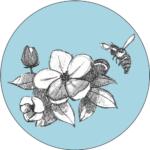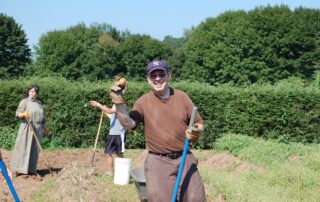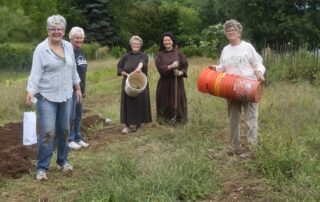 Pillar: Relationship
Pillar: Relationship
Laudato Si’ Action Plan Goals: Community Engagement and Ecological Spirituality
 Pillar: Relationship
Pillar: Relationship
Laudato Si’ Action Plan Goals: Community Engagement and Ecological Spirituality
Group (Grade Levels): ideally, teenagers
Learning Goals:
- Experience ourselves and our group as part of a wider community
- Connect the care of creation with the care of human beings
Materials Needed: Neighboring institution (perhaps a church) with a community garden, gardening tools, gloves, safety glasses if needed, first-aid kit, water bottles and snacks
Pre-planning: Talk with a representative from the neighboring institution, perhaps together with the youth, about goals and desires for their garden space. “Why are we here and why are we doing this?” If an established garden space exists, focusing on improving existing infrastructure. If no garden exists, focus may be on construction and establishment.
If needed, assign participants into groups beforehand.
General Outline of Experience
Guide the youth through the following Scripture and Laudato Si’ passages. Invite discussion on what God is asking of us today, using the suggested questions as guides.
- Matthew 25:31-40: “When the Son of Man comes in his glory, and all the angels with him, he will sit on his glorious throne. All the nations will be gathered before him, and he will separate the people one from another as a shepherd separates the sheep from the goats. He will put the sheep on his right and the goats on his left. “Then the King will say to those on his right, ‘Come, you who are blessed by my Father; take your inheritance, the kingdom prepared for you since the creation of the world. For I was hungry and you gave me something to eat, I was thirsty and you gave me something to drink, I was a stranger and you invited me in, I needed clothes and you clothed me, I was sick and you looked after me, I was in prison and you came to visit me.’ “Then the righteous will answer him, ‘Lord, when did we see you hungry and feed you, or thirsty and give you something to drink? When did we see you a stranger and invite you in, or needing clothes and clothe you? When did we see you sick or in prison and go to visit you?’ “The King will reply, ‘Truly I tell you, whatever you did for one of the least of these brothers and sisters of mine, you did for me.’
- What does it mean to treat others the way we would treat Jesus? How are we all worthy of being treated with reverence?
- Do you think all people are capable of relationship?
- How does our work in a garden today fit in with this passage? We’re not literally feeding, giving drink, clothing, etc.
- Let us learn from Pope Francis. He writes in Laudato Si’, n. 117-118: “Neglecting to monitor the harm done to nature and the environmental impact of our decisions is only the most striking sign of a disregard for the message contained in the structures of nature itself. When we fail to acknowledge as part of reality the worth of a poor person, a human embryo, a person with disabilities – to offer just a few examples – it becomes difficult to hear the cry of nature itself; everything is connected…There can be no renewal of our relationship with nature without a renewal of humanity itself. There can be no ecology without an adequate anthropology. When the human person is considered as simply one being among others, the product of chance or physical determinism, then “our overall sense of responsibility wanes.”
The Pope says we need to reverence, assist, and value both nature and human beings; we need to develop relationships with both nature and humans. Why?- Everything is connected. Everything comes from the hand of God and expresses God’s love for us, and for the world He created.
- How we relate to nature affects our relationship with others, and vice versa.
- Remind participants of the goals that were set during the planning phase.
- Orient participants to the tools and the places of the land.
- Discuss the workflow, how to work with friends while also getting the job done.
Garden Work
- Carry out the tasks of gardening.
- During a work period break, discuss the dignity of work. Reference the Opening Blessing in Laborem exercens, the papal encyclical on Work: “Through work man must earn his daily bread and contribute to the continual advance of science and technology and, above all, to elevating unceasingly the cultural and moral level of the society within which he lives in community with those who belong to the same family. And work means any activity by man, whether manual or intellectual, whatever its nature or circumstances; it means any human activity that can and must be recognized as work, in the midst of all the many activities of which man is capable and to which he is predisposed by his very nature, by virtue of humanity itself. Man is made to be in the visible universe an image and likeness of God himself, and he is placed in it in order to subdue the earth3. From the beginning therefore he is called to work. Work is one of the characteristics that distinguish man from the rest of creatures, whose activity for sustaining their lives cannot be called work. Only man is capable of work, and only man works, at the same time by work occupying his existence on earth. Thus, work bears a particular mark of man and of humanity, the mark of a person operating within a community of persons. And this mark decides its interior characteristics; in a sense it constitutes its very nature.”
- Especially if the work period is long, discuss challenges and re-direct.
- Review and discuss the work itself with a representative of the sponsoring institution.
- Review what was accomplished. What work remains?
- Discuss how to plan for future work, both for the garden and future care of creation in the wider community.
- How did doing this garden work help to connect you more with others?
- How do we measure progress?
- Both in the garden and society/in our social relations
- Often progress is associated with more and more “stuff.” But sometimes less is more and connecting with others in our community is more worthwhile than going shopping or even working in our own space. Have you ever experienced this?
- This is how Pope Francis expresses it, in Laudato Si’, 223: “In reality, those who enjoy more and live better each moment are those who have given up dipping here and there, always on the look-out for what they do not have. They experience what it means to appreciate each person and each thing, learning familiarity with the simplest things and how to enjoy them. So they are able to shed unsatisfied needs, reducing their obsessiveness and weariness. Even living on little, they can live a lot, above all when they cultivate other pleasures and find satisfaction in fraternal encounters, in service, in developing their gifts, in music and art, in contact with nature, in prayer. Happiness means knowing how to limit some needs which only diminish us and being open to the many different possibilities which life can offer.”
- Is growing in happiness one of the ways to think about progress?
- Is growing in relationship one of the ways to think about progress?
- Talk with the group about the way in which our work is not just for those present, but for all of God’s Children. It is a core value to care for “Our Common Home.”
- Discuss the African concept of “Ubuntu:” “My humanity is bound up in yours.” These core values are shared by many faith traditions. Earth Care is critical for “Us” and “We.”
- How is our service work “ecumenical?” Explain that ecumenical activities, prayers, or discussion bring together Christians of various denominations.
- How does our service work promote peace?
- Discuss this appeal by Pope Francis, Laudato Si’, 13: “The urgent challenge to protect our common home includes a concern to bring the whole human family together to seek a sustainable and integral development, for we know that things can change.”
Consider integrating these other Scripture passages into the gathering or integration time:
- Genesis 1:26-29 & 2:15: Then God said, “Let us make mankind in our image, in our likeness, so that they may rule over the fish in the sea and the birds in the sky, over the livestock and all the wild animals, and over all the creatures that move along the ground.” So God created mankind in his own image, in the image of God he created them; male and female he created them. God blessed them and said to them, “Be fruitful and increase in number; fill the earth and subdue it. Rule over the fish in the sea and the birds in the sky and over every living creature that moves on the ground.”
- Why did God give us the gift of creation? Why did he trust us with its care?
- Ephesians 2:19-22 and/or 1 Corinthians 3:9
- How do we help to build the community and the Church with service projects?
- How do we promote human dignity and feelings of belonging through community service?
- How do we promote inclusion and diversity through community service?




